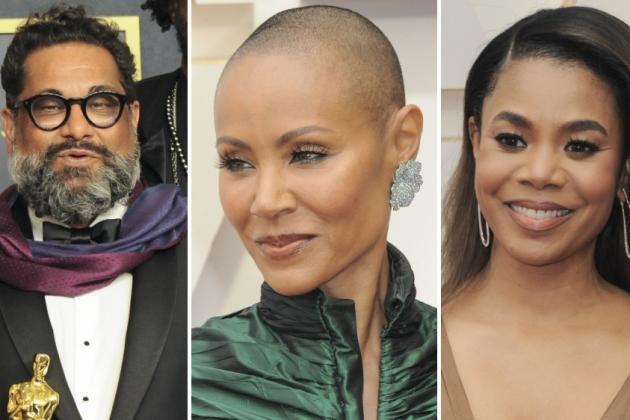
Will Smith, Chris Rock and the Academy may feel they can turn the page on this dramatic chapter following the announcement that Smith would be banned from the ceremony for 10 years. But there’s too much reliance on written statements and not enough acknowledgment that multiple apologies are missing from all parties.
For Smith, who won best actor for his performance as Serena and Venus Williams’ father in “King Richard,” an Instagram post saying he “accepts and respect the Academy’s decision” is not the type of penance the general public, the industry, your colleagues and co-stars are expecting.
More from Variety
For Rock, he shouldn’t be gearing up to cash in for some standup comedy special about what happened, and his silence about his role in this ordeal has been deafening.
For the Academy, an acknowledgement to Rock for not making the situation worse, or for not kicking Smith out of the room is only the tip of the iceberg for the radical changes that are needed within your organization to ensure the Oscars can survive until the end of Smith’s “10-year sentence.”


However, Smith isn’t the only villain in this story. There isn’t even a “good guy” in this tale, only many people who made bad decisions. Smith has received his punishment, but that doesn’t absolve the Academy nor Rock’s responsibility and their need to make amends to more than one party.
The road to redemption must include an acknowledgment of all the parties hurt and affected, making amends and putting certain practices in place to ensure lessons are learned and applied to prevent future mistakes.
That list must include actress Jada Pinkett Smith, producer Joseph Patel, the Oscar hosts Regina Hall, Amy Schumer and Wanda Sykes, the producers and staff of the telecast, and every viewer in attendance, and at home who were force-fed the revisionist history and messaging that came afterward. No more hiding behind surgically curated statements and tweets. It’s time to make direct amends with all hurt parties by Smith, Rock and the Academy. No one is standing tall after this year’s telecast.
I’m not saying Smith’s punishment is not warranted, as walking up to a stage and slapping someone during a live telecast was beyond reprehensible. It’s not just the act of assault, but the stain on the legacy of the very few Black people who have won lead actor or actress statuettes in 94 years. Smith is only the fifth, and he’s now synonymous with what is arguably the craziest moment in the ceremony’s history.
While some will look at the Academy’s ruling as excessive, and others say it doesn’t go far enough, the truth is there was little to no recourse for the Board of Governors, given Smith’s resignation from the Academy on April 1. As he is no longer a member, Smith was no longer subject to other censures or financial sanctions the Academy could levy. Rest assured, if he had still been an active member during Friday’s board meeting, expulsion from the Academy would have been a likely outcome, but perhaps with a shorter ban from future ceremonies.
The calls for the Academy to “take back” the statuette, or for Smith to return it himself, are downright embarrassing. The ballots were in, and the votes were tabulated. There isn’t an “undo” feature for the Academy Awards, and if there was, it’s not certain a multiverse revisionist cross-correction of the 2021 best actor race would be at the top of the list.
If Smith were to “return” it, then what? Do you re-engrave it with the names of Benedict Cumberbatch (“The Power of the Dog”) or Andrew Garfield (“Tick, Tick … Boom!”)? Indeed either of them becoming “Academy Award winner” with an asterisk (*) next to their name for the rest of time would not be fair to two people who had nothing to do with these events. What about the celebrities that have “refused” their Oscar but are still considered “winners?” Marlon Brando refused his statuette for “The Godfather” (1972), sending Sacheen Littlefeather in his place the same night that John Wayne reportedly had to be restrained by security guards because he was trying to charge the stage. Where are the calls to “take back” his Oscar for “True Grit” (1969)? Oh, is it because it didn’t happen during the night of his win, so that it makes it “apples and oranges,” or is perception and tarnished images enough punishment for Smith to endure for the rest of his days?


Harvey Weinstein doesn’t have access to his Oscar from his jail cell (for best picture for “Shakespeare in Love”), and Roman Polanski (director winner for “The Pianist”) is a fugitive from the law after raping a child, but, sure, let’s have the fifth Black actor in history return his award because he slapped someone. That isn’t very sensible.
When it comes to the consequences that Smith could have received, we can have a lively debate on what was appropriate, but it comes down to what was available for the Board of Governors to impose. Multiple sources within the Academy and its Board have shared that members of Academy leadership were upset by Smith’s resignation ahead of their originally planned April 18 meeting. But, honestly, what option did he have after what looks to be a blatantly wrong explanation of what happened following “the slap?”
After the Academy released a statement saying it asked Smith to leave but he refused, something that multiple sources have refuted, he was no longer just the guy who slapped Chris Rock on the air. He is now an angry Black man who performed an egregious assault on someone and, in addition, is also a celebrity who resists removal from a venue because he feels entitled to be there.
That version of events as detailed by the Academy, it could be argued, caused far more damage to Smith’s career and public image than the slap itself. It’s another example of art imitating life, but not in the way Smith referenced during his Oscar speech. It reminds me of Smith and actress Janet Hubert’s conversation on “The Fresh Prince of Bel-Air Reunion” that aired on HBO Max in 2020. In their tearful exchange and recollections of the events that led to her leaving the 1990s sitcom, Hubert says to Smith: “Words can kill. I lost everything, reputation, everything. I understand you were able to move forward, but you know those words, calling a Black woman difficult, in Hollywood, is the kiss of death.”
The Academy must reflect on its actions when they say Smith “refused.” Then, acknowledge it, make amends, and do better moving forward.
Still, there are other issues for AMPAS that don’t begin with Will Smith. His 10-year ban seems to come with an underlying message — you can be a horrible person, even violent within the confines of your office or home, spew racist remarks, and even be known for sexual misconduct, but as long as that takes place outside the Dolby Theatre on Oscar night, you are welcome.
There are dozens of problematic figures within the Hollywood studios and networks in Hollywood who sit among the Academy’s members. However, they can and regularly do attend the Oscars. The Academy’s Standards of Conduct was a decent start in December 2017, but now, it must be expanded upon. There have been multiple calls to have Smith “tarred and feathered,” professionally speaking. So how do you address the problematic members of your past and create a system that will make the consequences for a breach of the “Standards of Conduct” feel consistent?
If Smith were a member of the Academy at the time of the Board meeting, what would have been his ultimate fate? Smith likely knew he was facing down the barrel of expulsion from the Academy, something only five people in history have faced:
-
Carmine Caridi – an actor best known for his role as Albert Volpe in the best picture winner “The Godfather Part II” (1974), was kicked out in 2004 for sharing and duplicating VCR copies of screeners with Russell Sprague. In exchange for immunity, he turned in Russell Sprague, who died of a suspected heart attack while awaiting sentencing, and after Sony and Time Warner sued Caridi for copyright infringement. Caridi was cleared of all wrongdoing.
-
Harvey Weinstein – the producer who won an Oscar for best picture for “Shakespeare in Love” (1998), was expelled in 2017 after the New York Times exposed decades of sexual harassment and rape. He’s currently serving a 23-year prison sentence for his crimes.
-
Bill Cosby – the Emmy-winning actor and comedian, was kicked out in 2018, one month after being found guilty of sexual assault and sentenced to 10 years. That conviction has been overturned, but the Academy has not reinstated his membership.
-
Roman Polanski – The director was kicked out of the Academy in 2018, 41 years after he pleaded guilty to intercourse with a minor in 1977. After his plea, he fled the U.S. and remained a fugitive. However, that didn’t stop the Academy from rewarding him for directing “The Pianist” (2002), with the Oscar being accepted on his behalf by Harrison Ford, who later personally delivered it to him in Europe.
-
Adam Kimmel – Variety revealed the cinematographer’s history as a registered sex offender. The Academy took action and kicked out the DP who had worked on films such as “Capote” (2005).
Should Smith be included in the same sentence as those figures?


As society sits divided on how we should react to wrongful acts committed by celebrities, it’s essential to highlight the reaction to Smith’s act and what the Academy leadership was being called upon to do. The people who decry the “woke mindset” and “herd mentality” wanted to see the blood of the Oscar-winning actor smeared for public display.
Smith displayed blatant mistakes, but that’s not solely on him. Chris Rock isn’t squeaky clean in this mess either, despite being the “victim” of the slap. There have been reports that Rock didn’t know that Pinkett suffered from alopecia, and if true, we’ll take him at his word. However, his joke about her bald head (no matter what Bill Maher’s vapid takes on the matter are) has had media analysts and consumers restating the first amendment as a pledge of allegiance to the protection of free speech. They equate Smith’s assault on Rock as a dangerous precedent in the freedom to “say whatever you want.” Comedy is not some untouchable entity unburdened from consequences and criticism, as much as people have been using as defenses for figures like Dave Chappelle, Louis C.K., and others. You can’t say anything you want just because you have the right to do so.
Words do have consequences, and they can hurt. You never know what’s going on with someone internally. The classy thing to do would be for him to apologize to Jada directly, since she was visibly upset by the joke.
Rock also made a disrespectful joke after the slap when announcing “Summer of Soul” as the documentary winner. “The Oscar goes to “Ahmir ‘Questlove’ Thompson and a group of four white guys,” Rock said at the time. Not only do all the winners deserve to be named, but even worse, one of the producers, Joseph Patel, is South Asian, one of three that won on the same evening. This wasn’t a joke he made on the fly after being slapped. Rock made the quip during the rehearsal the day before. In the Academy’s statement, the organization expressed “deep gratitude to Mr. Rock for maintaining his composure under extraordinary circumstances.”
It should be noted that Rock’s reaction could have worsened a terrible situation. Unfortunately, however, there’s still been no apology to Pinkett or Patel individually by either the Academy or Rock’s camp. Apologies are needed all around, and there’s no winner in this situation. As far as I’m concerned, they all lost that night. But again, to be clear, this doesn’t absolve Smith’s acts in any manner.
The Academy must address the image of inconsistency following the punishments for misconduct. For example, convicted criminals Weinstein and Polanski would be allowed, in theory, to attend a future ceremony if another attendee chose to bring them as their guests. While the Academy can probably safely rely on the fact that the two will be tied up in litigation and its members wouldn’t commit career suicide by bringing them into the Dolby, Trump’s election to the presidency has shown us that no wrong choice, no matter how blatantly obvious, can be left up to chance.
Look at someone like Cosby. He was expelled the same day as Polanski, one month after his conviction. Since then, his conviction has been overturned. Should he have his membership reinstated since he’s no longer a convicted criminal? Of course not, but the organization has left itself vulnerable to potentially harmful (and stupid) choices if the wrong people voice a concern. They’ll have to revisit its policies and make them crystal clear.
And finally, there’s the role of the general public and social media commenters, who should also do their best to allow the latitude for mistakes seen as problematic only in hindsight. We can hotly debate the actions of others during past ceremonies, such as Adrien Brody kissing Halle Berry against the actress’ will after winning best actor and even the decision not to remove Smith from the room. The Academy has apologized for its shortcomings there and that is something we should respect.
Suppose the Academy, Rock and Smith take the proper steps to show their remorse and responsibility. Only then can we all finally move on – and go back to making sure that eight below-the-line Oscar categories will never be pre-taped at a future ceremony ever again.
The history-making winners of this year’s Oscars have been nearly overshadowed due to Smith’s actions, including Ariana DeBose (“West Side Story”) as the first queer woman of color to win an acting award, Troy Kotsur (“CODA”) being the first male deaf actor to win, not to mention the industry-wide significance of “CODA” becoming the film released by a streaming platform to win best picture.
For the respect for those who have had their spotlights lost in the shuffle, let’s allow their achievements to lead further 94th Oscars stories — at least while our culpable partakers heed the aforementioned advice.
(Pictured at top: Joseph Patel, Jada Pinkett Smith and Regina Hall.)
Best of Variety
Sign up for Variety’s Newsletter. For the latest news, follow us on Facebook, Twitter, and Instagram.




